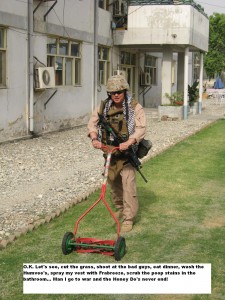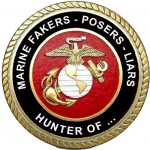SgtMajor 101
February 14th, 2012 Posted in The SandGram v1.0
This came from Afghanistan and with comments that made me spit up my coffee this morning. We’ll call it Command Sgt Major 101…they mean well. Guess they could say that about my writing too!
XXXXXXX, XXX A CSM USARMY (US)
Subject: DCSM (UNCLASSIFIED)
Classification: UNCLASSIFIED
Caveats: FOUO
I just wanted to take a moment of your time to express how I feel about those that believe there is a difference in tactical warrior capability and garrison Soldierly duties.
(One sentence is not a paragraph. Paragraphs have an overall thematic sentence, followed by two or more supporting sentences. Simply tossing out one-off sentences as a paragraph is bad writing.)
There is no need to reply back to this message (unless you feel you need to) as these are simply my concerns from recent observations and discussions on the CG’s Change of Command and the standards of discipline and responsibility the CG and I have directed with 25th ID Leaders on Schofield Barracks and Wheeler.
(Again, one sentence is not a paragraph. Moreover, using nine subordinate clauses in one sentence goes beyond run-on, and borders on the intentionally confusing. The Army actually does have a style manual—you may want to peruse it prior to sending a missive about standards.)
I truly hope you see the passion I have for this Division and assist me in making every Soldier/Leader (to include you) the most combat effect and disciplined Soldier in our profession of arms.
(Sigh. I guess you are just going to keep rolling with the one-liners. Also, I don’t know how to make a soldier or leader “combat effect.”)
I know we have NCO’s that are struggling with why they should have to do military parade ceremony’s or policing other community/unit areas when those things are not in-line with their war-time mission preparation, or because they should be initialed to “NOT” do those type of events so they can stay focused at the tactical level.
(NCOs, not NCO’s. Ceremonies, not ceremony’s. As for being initialed, I have no idea what you are trying to convey.)
The discipline in enforcing and applying Army garrison standards and Army regulation (AR) 600-20 “Customs and Courtesies” is directly in-line with the tactical application of your Soldiers ability to effectively conduct your units war-time mission. ( I forgot one: AR 600-20 is Army Command Policy. AR 600-20 says f**k-all about ceremonies, parades, drill, formations, or work details. FM 7-21.13, (Chapter 4) covers customs and courtesies (The Soldier’s Guide) and FM 3-21.5 covers Drill and Ceremonies. You’d think a Division Command Sergeant Major would know that–at least know enough to quote the proper Manual (formerly called the Manual for Customs and Courtesies, and not an AR–Army Regulation. Two COMPLETELY different things.) We are duty-bound to respect and follow our commanders in the most extreme hostile environment, so we must demonstrate just as much respect and honor to that person/position (Officer or NCO) in our demonstration of garrison duties and ceremonies. Every NCO is obligated to enforce strict military customs, courtesies, and discipline so our Soldiers have the opportunity (even if they don’t want to) to demonstrate and display their respect and discipline within their units and themselves.
(Soldiers’ ability. As far as “Garrison Standards,” I thought there was only one standard, applicable throughout the Army. Also, not every word that shows up in your spell check is simply in need of hyphenation. Some of them, like wartime, are actual compound words, others are separate words, like duty bound.)
If your subordinate (or superior) leaders don’t want to do a ceremony for any reason it is a good gage to see if that leader deserves to be in that position of responsibility if they can’t handle a simple garrison ceremony or detail as they prepare for war…yes, it is hard at time, that’s why it’s called military “service”.
Period goes inside the quotation marks. So if a commander believes that, for instance, a unit conducting a weapon qualification range is more important than attending the Commanding General’s monthly retirement ceremony, then he is, in your estimation, unworthy of command? What happened to “We are duty-bound to respect and follow our commanders…” and “we must demonstrate just as much respect and honor to that person/position…?” Are you asking Noncommissioned Officers to gauge (not gage) whether a superior officer deserves to be in the position they hold? Aren’t those positions chosen by officers superior to those officers, and often, by the department of the Army?
I know military ceremonies are hard and demand the strictest of Army discipline with much rehearsal and practice (just like combat missions), (No one ever tried to kill me at a parade) which is why we should always send a message during every CoC or CoR (down to Company level) to those observing that the Warriors of 25th ID are not only tactical expert war fighters (that’s a good place for hyphens) but also disciplined, high standard Soldiers in garrison. This is the units and Soldiers opportunity to show their respect and discipline to the unit (not just the person taking it) and display the “Courage” to enforce precision and order no matter how bad the weather is, the time standing at parade-rest on the parade field, or the uniform worn during the event. We all know nothing grows from “ease” or “comfort”, whether we dread or empower the challenges of garrison duties we must face them each day and avoid the easy trail. (Have you been drinking?) As Leaders of our nations (nations’) warrior class we must see this as a tool to become better and develop the art of mastering courage by enforcing the standards of discipline in our garrison duties and teach, coach, and mentor it in our Soldiers and subordinate Leaders. (Are you seriously trying to tell me that discipline and courage under fire comes from gleefully standing in formations under the tropical sun, while commander after commander reflects to no one in particular the great things he thinks he’s accomplished?)
Again, it will be hard, (that’s what she said) but it is the right thing to demonstrate especially as we prepare for other war-time (wartime) operations around the globe. We must challenge our Soldiers, Leaders, and formations with these types of events to keep them grounded to be tactically proficient in the field and draconianly (I do not think that word means what you think it means) strict on garrison standards of discipline.
I will send out a quarterly Division-CSM message at the end of the month for all Division Soldier/Leaders to read with parts of this message in mind and hope the areas I address are in-line with your leadership style also. (You better feel the same way I do. I will send out a message in two weeks saying essentially what I just said, but I think I will have someone proofread that one, so I don’t sound like I failed eighth grade writing composition—twice.)
Thank you for your time and patience with this message and please let me know if there is ever anything I can do for you or your Warriors. (Well, you could stop having so many pointless parades and ceremonies…)
“Tropic Lightning!”
v\r
XXX A. XXXXXXXXX Jr.
Command Sergeant Major, USA
Division Command Sergeant Major
Tags: Afghanistan, funny Army stories, SgtMajor, Tropic Lightning





